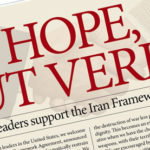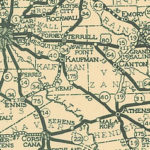ATLANTA (ABP)—A lot of things surprised McAfee School of Theology’s Robert Nash during an academic delegation to Tehran.
 Tehran with mosque in the center. (ABP Photo: Robert Nash)Surprises included being served name-brand American soda, feeling safer there than some places in the United States, and just how much being Baptist would help him during discussions with Iranian religious scholars.
Tehran with mosque in the center. (ABP Photo: Robert Nash)Surprises included being served name-brand American soda, feeling safer there than some places in the United States, and just how much being Baptist would help him during discussions with Iranian religious scholars.
But maybe the most astonishing was learning the nation’s top cleric, Ali Khamenei, had issued a religious decree, or fatwa, prohibiting the creation or use of nuclear weapons.
“I don’t think most Americans know that,” said Nash, former global missions coordinator for the Cooperative Baptist Fellowship and associate dean and professor of missions and world religions at Mercer University’s McAfee School of Theology.
Academic exchange
He participated in a delegation of American scholars to Iran led by Conscience International founder James Jennings. The group met with Iranian counterparts to discuss a wide range of topics and to make arrangements for future academic exchanges.
Nash returned home encouraged that government and university officials in Iran seem inclined to build on improved relations with the United States.
 Robert Nash“I was surprised at the number of officials in the Iranian government who were trained and educated in American universities, with Ph.D.s from places like UCLA, Boston University, Notre Dame—one after another,” he said.
Robert Nash“I was surprised at the number of officials in the Iranian government who were trained and educated in American universities, with Ph.D.s from places like UCLA, Boston University, Notre Dame—one after another,” he said.
Overall, Nash characterized the trip as “unbelievable on so many levels,” beginning with the beauty and cleanliness of Tehran, as well as the warm reception the Americans received from people on the city’s streets.
Sign up for our weekly edition and get all our headlines in your inbox on Thursdays
Three-hour meeting
The Iran-based Institute for Political and International Studies, a branch of the foreign ministry, arranged a three-hour meeting between the delegation and the chief Iranian negotiator in Geneva for controlling their nuclear program.
Iranian President Hassan Rouhani “has a window of time, but there are forces in Iran who are ready to step in and fight against this opening and efforts to control its use of nuclear energy,” Nash observed.
“On the U.S. side, we have a president and secretary of state … who are willing to do things that no one has been willing to do in the past. … So there are also forces in favor of this peace, and we have the opportunity to work alongside them to make it happen.”
One group of scholars charged with promoting understanding of the Iranian revolution in the nation’s history asked about the American Revolution—how it gave meaning and purpose to the United States and the degree to which religion played a role in it, he said.
“I talked about the Puritans and those Puritan mythologies of a chosen people, a city set on a hill, and how these mythologies have helped us to keep our moral compass,” Nash said.
Freedom of religion
He also offered insights from Baptist history.
“I mentioned Roger Williams a couple of times, because Williams based his notions of religious freedom upon the sovereignty of God. I said because God is sovereign, I can’t violate God’s sovereignty by telling you what to believe,” Nash said. “My point to them was that there is room for freedom of religion even if you espouse the sovereignty of God, and even if you hold the belief that your understanding of God is the right understanding.”














We seek to connect God’s story and God’s people around the world. To learn more about God’s story, click here.
Send comments and feedback to Eric Black, our editor. For comments to be published, please specify “letter to the editor.” Maximum length for publication is 300 words.